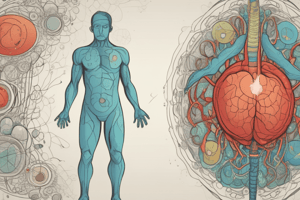Podcast
Questions and Answers
What is the cause of Type B hepatitis?
What is the cause of Type B hepatitis?
- Exposure to contaminated blood products (correct)
- Injection drug use
- Ingestion of contaminated food or water
- Sharing needles
Which type of hepatitis is classified as non-infectious?
Which type of hepatitis is classified as non-infectious?
- Type B
- Type C
- Type A
- Autoimmune hepatitis (correct)
What is a common symptom of hepatitis?
What is a common symptom of hepatitis?
- Yellowing of the skin and eyes (correct)
- Headache
- Chest congestion
- Muscle pain
How is Type A hepatitis mainly transmitted?
How is Type A hepatitis mainly transmitted?
What distinguishes Type D hepatitis from other types?
What distinguishes Type D hepatitis from other types?
How can autoimmune hepatitis be characterized?
How can autoimmune hepatitis be characterized?
Why is early detection crucial for hepatitis?
Why is early detection crucial for hepatitis?
How do physicians typically diagnose hepatitis?
How do physicians typically diagnose hepatitis?
What type of medications are commonly used to treat hepatitis B and C?
What type of medications are commonly used to treat hepatitis B and C?
Which of the following is NOT a method used in diagnosing hepatitis?
Which of the following is NOT a method used in diagnosing hepatitis?
What role do vaccines play in preventing hepatitis?
What role do vaccines play in preventing hepatitis?
Why is it important never to ignore signs pointing towards hepatitis?
Why is it important never to ignore signs pointing towards hepatitis?
Flashcards are hidden until you start studying
Study Notes
Hepatitis: Understanding the Disease and Its Types
Hepatitis refers to inflammation of the liver, which can result from various causes. This condition affects millions worldwide each year and is classified into five main categories based on specific etiologies:
Type A hepatitis (Infectious)
Caused by: The hepatitis A virus (HAV), spread through ingestion of contaminated food or water or direct contact with an infected person.
Type B hepatitis (Infectious)
Caused by: The hepatitis B virus (HBV), transmitted via blood or other bodily fluids, sexual activity, sharing needles, or during childbirth. It's often chronic if untreated.
Type C hepatitis (Chronic Infection)
Caused by: The hepatitis C virus (HCV), commonly acquired through exposure to contaminated blood products; injection drug use; or less frequently, sexually.
Type D hepatitis (Rare)
Type D hepatitis occurs when both hepatitis Delta (HDV) and another type (usually HBV) coexist within the body. HDV uses HBV's surface proteins to enter cells and cause damage.
Autoimmune hepatitis (Non-infectious)
Caused by: An autoimmune reaction where the immune system mistakenly attacks healthy liver tissue. The exact trigger remains unknown.
Symptoms
Symptoms may vary depending upon the type and severity of hepatitis. Common indicators include fatigue, loss of appetite, nausea, vomiting, abdominal pain, dark urine, clay-colored stools, joint pain, jaundice (yellowing of the skin and eyes), and fever. Many people experience no symptoms, especially during acute hepatitis cases. However, it's essential never to ignore signs pointing towards this condition, as they might indicate severe complications and even cirrhosis later on.
Diagnosis
Early detection is crucial to prevent long-term liver damage caused by chronic forms of hepatitis, such as HCV or HDV. Physicians typically base their diagnoses on clinical history, physical examination results, and medical tests like serological testing, viral RNA quantification using polymerase chain reaction (PCR), imaging studies like ultrasound or CT scans, and sometimes liver biopsies to evaluate the extent of liver damage.
Treatment
The choice of therapy depends largely on the causative agent and its stage. Medications used to treat hepatitis include interferons, nucleoside analogues for hepatitis B and C, antiviral drugs for hepatitis A, corticosteroids for autoimmune hepatitis, and supportive care involving rest, nutritional guidance, and attention to fluid balance. Vaccines also exist against hepatitis A and B. Prevention and education play significant roles in reducing transmission rates and preventing disease occurrence.
Studying That Suits You
Use AI to generate personalized quizzes and flashcards to suit your learning preferences.





